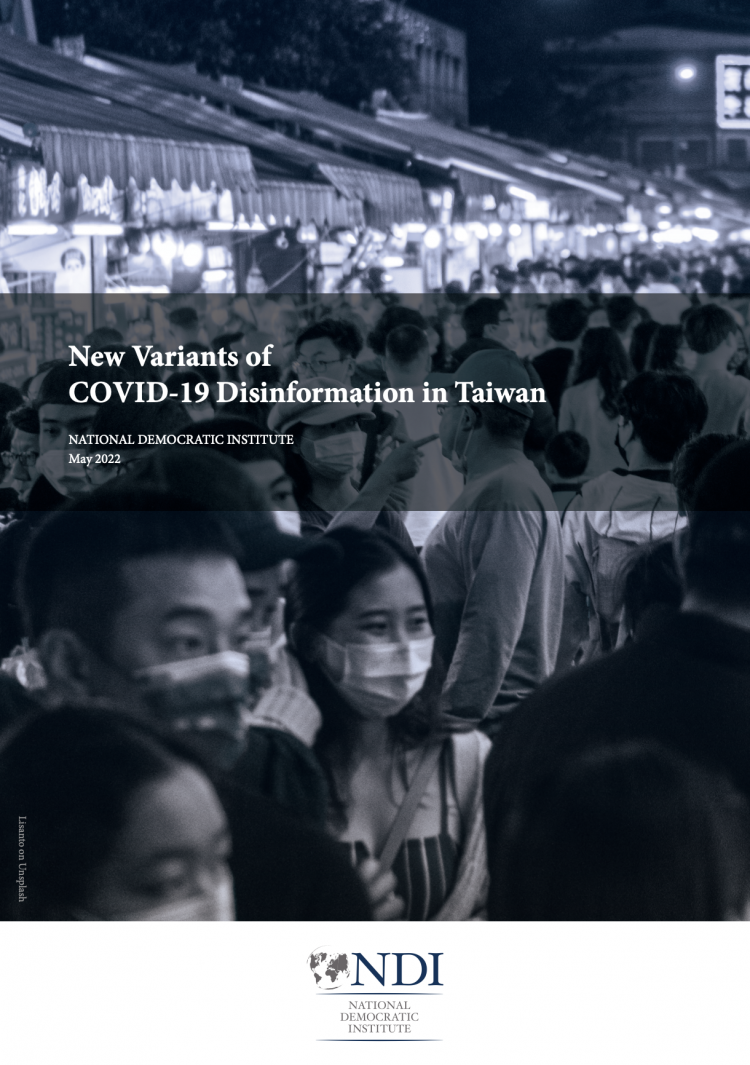New Variants of COVID-19 disinformation in Taiwan
The onset of the COVID-19 pandemic shook the world as many countries experienced high infection rates and overburdened healthcare systems throughout 2020 and 2021 while attempting to rapidly develop vaccines, obtain vaccines from foreign manufacturers, and identify new treatments. However, throughout the early months of the pandemic, Taiwan, an island country of over 23 million people, experienced mostly single digit case numbers and no deaths. In January 2020, the Taiwan Center for Disease Control (CDC) responded rapidly upon learning of the new disease outbreak in Wuhan, China by sending two experts to assess the situation. Throughout the early months of 2020, Taiwanʼs government made early calls to start implementing then novel COVID-19 regulations, now common practice globally. These regulations included imposing travel restrictions on entering Taiwan, contact tracing requirements across the country, and lengthy quarantine timelines. The island remained relatively untouched by the COVID-19 pandemic until May 2021, over a year into the global health crisis.
On May 12, 2021, Taiwan experienced its first COVID-19 outbreak. For Taiwanʼs residents, the pandemic went from being a distant year-long global health crisis, to being all too real and life altering. As Taiwanʼs residents switched to a new reality of increased societal stress, Taiwan also became a hotbed of COVID-19-related disinformation and misinformation. Following the May 2021 outbreak, online false content fanned distrust of government COVID-19-related policy decisions and local officials while a panicked general public eagerly sought information regarding the virus. Taiwan has long been a target for disinformation and has an advanced civic tech community dedicated to countering false narratives with the support of Taiwanʼs government. However, although the debunking process in Taiwan was swift, it was powerless in the face of conspiracy theories built slowly over time, from various sources.
Countering COVID-19 related disinformation has been a high-priority for most governments throughout the pandemic as misinformation and disinformation has slowed vaccination rates; encouraged ineffective, and at times dangerous, treatments; and exacerbated societal and political tensions. Taiwan was no exception in this case. However, since disinformation is generated by domestic and international sources, an onlooker could easily underestimate or overestimate foreign influence, especially in Taiwan where such external campaigns are common and expected. To understand the intended impact of COVID-19-related disinformation in Taiwan, it is imperative to first understand the how and why behind the spread of these campaigns, to identify the most likely source and reason.
This study used Facebook, the top social media platform in Taiwan, to archive posts related to the pandemic from May 12 through the end of 2021, and then categorized them into groups to determine foreign influence. It was found that vaccine propaganda from China flooded Facebook starting in mid-May with the help of over 700 fake accounts and several YouTube channels registered in Algeria, Cambodia, Russia, as well as China. Accounts would remain dormant and post anodyne content unrelated to the COVID-19 pandemic until becoming active in a coordinated fashion to spread specific false narratives. Judging by the criteria this study proposes—including timing, consistency, persistence, latency, stealth, credibility, and availability—these all-out disinformation campaigns were often significant, creating challenges for Taiwanʼs defense frameworks.
From this study, the following key takeaways have been identified in relation to how and why the COVID-19 disinformation campaigns occurred:
- The outsourcing of information operations to organizations in Southeast Asia might play a significant role in China dissemination campaigns. This method can be identified by analyzing information outside of Chinaʼs official media outlets. Marketing companies, hacker communities, universities, state-owned companies, and online influencers are all potential third parties of the Chinese Information Operation (CIO) ecosystem.
- The outsourced accounts and channels used a familiar tone to pretend to be local citizens who cared about politics. The content did not promote pro-China messages, but instead was aimed at creating chaos, distrust, and division within Taiwanʼs society.
- Domestic events in Taiwan may not serve as the only or even most relevant indicator of predicting foreign information operations. The domestic policy environment in China and the international policy environment are also relevant indicators. Foreign information operations that appear to be against Taiwan may in fact be aimed at Chinaʼs domestic audience. International politics and other factors are more likely to influence how and why CIOs work.
- Conspiracy theories generated by outsourced CIOs were constant in regard to focus on specific subjects and pattern of posting on social media platforms. These patterns were recognizable and link the groups together, as demonstrated by the research completed here.
- Outsourced CIOs pose a new and unique challenge to those combatting disinformation campaigns. Chinese government representatives are increasingly coordinating with domestic and international groups that are not explicitly connected with Beijing, enabling more latitude and engagement with communities that would not trust official sources.
- Facebook botnets and YouTube channels have become key players in the dissemination of COVID-19 related disinformation in Taiwan. These accounts have collaborated, relayed information, and resonated with Chinaʼs official media outlets, indicating a multi-platform, multimedia approach of amplified network effects.
